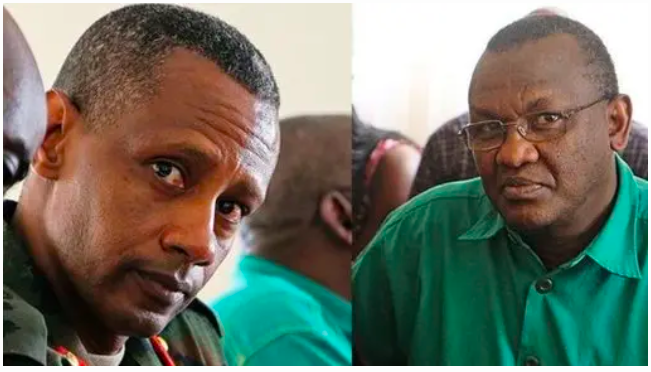Kigali, March 13, 2024- Former Rwandan military officers, Colonel Tom Byabagamba and Brigadier General Frank Rusagara, opted to withdraw their case from the East African Court of Justice (EACJ). This case, initially filed at the EACJ’s sub-registry in Nairobi in 2020, was aimed at contesting the legality of their convictions and demanding the nullification of their sentences imposed by the Rwandan judiciary.
Byabagamba and Rusagara, who are presently serving a 15-year sentence in Rwanda, faced multiple charges, including inciting public insurrection against the government, illegal firearm possession, and engaging in activities that purportedly besmirched Rwanda’s national image. Their legal odyssey through Rwanda’s courts concluded with the Kigali Court of Appeal reducing their initial sentences from 21 and 20 years down to 15 years respectively.
Upon depleting all available legal remedies within Rwanda, the duo approached the EACJ. Their litigation was anchored on alleged violations of Articles 6, 7, and 8 of the treaty that established the East African Community, asserting that their detention was not only unlawful but also infringed upon their rights. Additionally, Byabagamba’s petition included a plea for reinstatement to his former military status, without demotion.
Their attorney, Michael Osundwa, facilitated the legal proceedings until the unexpected withdrawal request was made in March, a decision that was met without public justification from their side. This move was acknowledged by a Rwandan attorney general who was present at the session via video link, affirming the petitioners’ right to retract their application. Consequently, the EACJ’s panel of five judges acceded to this request, leading to the official termination of the proceedings.
The backdrop of this legal withdrawal is tinged with speculation, notably around the potential impending release of Byabagamba and Rusagara, possibly under a presidential pardon. This hypothesis gains traction considering past instances where legal withdrawals have seemingly been a prerequisite by the Rwandan government for granting clemency, as observed in the cases of Kizito Mihigo and Paul Rusesabagina.
Adding to the narrative are the personal hardships encountered by Byabagamba and Rusagara during their incarceration. Rusagara, for instance, was notably denied the opportunity to speak to his wife over the phone during her final moments in a UK hospital—a poignant detail reflecting deeper human rights concerns. Byabagamba’s account of his detention conditions, which led to significant back pain due to the constrained space, further highlights the severity of their treatment. It is also noteworthy that Rusagara’s wife is the sister of Byabagamba, and Byabagamba shares familial ties with Dr. David Himbara, a known critic of the Rwandan government, which adds layers of personal and political complexity to their case.
This episode not only sheds light on the personal and legal struggles of Byabagamba and Rusagara but also casts a broader shadow on the landscape of political dissent, judicial independence, and human rights in Rwanda. As the country continues to make strides on the international stage, the dynamics between its internal governance and external judicial engagements remain a focal point of scrutiny and debate.
































































